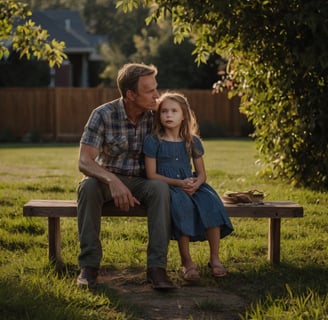
The Hidden Costs of Parental Stress on Family Dynamics
Discover the hidden costs of parental stress on family dynamics in this insightful article. Learn how stress affects relationships, parenting behaviors, and child well-being, and uncover effective strategies for mitigating its impact. The Hidden Costs of Parental Stress on Family Dynamics promises to provide practical tips and actionable insights to create a healthier, more balanced family environment.
PARENTING STRESS
1/21/20256 min read
Parenting is one of the most rewarding yet challenging roles, and the hidden costs of parental stress on family dynamics often remain overlooked.
When parents are overwhelmed, external factors like the influence of work relationships on stress and mental health, hybrid work models and the relationship between physical inactivity and workplace stress can compound stress at home.
Additionally, challenges such as flexible work arrangements and substance abuse due to workplace stress ripple through families.
Balancing responsibilities is further complicated by the need for achieving harmony between work and personal life.
This article will delve into these interconnected issues and provide actionable insights for creating a healthier family dynamic.
Our conviction is that stress is mitigated by messages we tell to ourselves and the ones that we receive from our environment. At last, everything boils down to good communication. Our idea is to convey messages of happiness, peace and wisdom. That is why we have open our own Etsy store where we offer clothing that carry ulifting messages based on the wisdom of our four legged friends. We are convinced that they know more about life then us humans. We would appreciate if you would find the time and stop by. We are sure that we have somethng tailored just for you!
And know, we move on with our main subject.
The Hidden Costs of Parental Stress on Family Dynamics
The hidden costs of parental stress on family dynamics can disrupt the delicate balance of family life, leading to challenges in relationships, parenting behaviors, and child well-being.
Research highlights that when parents experience stress, it often translates into reduced emotional availability, increased conflict, and weakened family cohesion.
Addressing these hidden costs requires understanding their origins and taking actionable steps to mitigate their effects.


How Stress Shapes Parenting Behaviors
Parental stress reshapes how we perceive and respond to our children, sometimes in ways we don’t immediately recognize. As highlighted by Senn et al. (2023), stress mediates the link between external challenges and the emergence of dysfunctional parenting patterns.
For many of us, financial strain or insufficient support systems can sap our patience and make us reactive, even when we aim to do better. Over time, these reactions risk creating a cycle of negativity, impacting the entire family dynamic.
For instance, when we face financial difficulties, it’s easy to see how anxieties might spill over into our interactions with our children. Being overly critical or emotionally unavailable, though unintentional, can weaken trust and create tension at home.
These stress-driven behaviors don’t just affect the immediate environment—they can chip away at a child’s self-esteem and undermine their ability to cope with future challenges. Recognizing these patterns allows us to address stress at its core and foster a more nurturing family environment.
Stress accumulates, often without us realizing its full weight. Senn et al. (2023) remind us that first-time parents are especially vulnerable, their stress amplifying patterns that can spiral into dysfunction. When we intervene early—seeking guidance or leaning on support networks—we create a chance to break this cycle, paving the way for healthier, more consistent parenting.
Impacts on Family Harmony and Support Systems
The stress we carry as parents doesn’t stop with us; it ripples across our families, testing relationships and support systems. Research by Dincer and Tunç (2023) reveals that heightened stress can diminish our confidence in parenting and, in turn, weaken the bonds within our families.
Yet, when we tap into robust social support networks, whether through close friends, extended family, or community programs, we find a buffer that helps us navigate these challenges.
Communication and shared responsibilities are the bedrock of family harmony, yet stress has a way of eroding both. It’s something we’ve likely all experienced—moments where the weight of stress pushes us to withdraw emotionally or overcompensate by becoming controlling.
In doing so, we unintentionally create feelings of neglect or resentment among family members. However, by opening ourselves to external support—be it through a trusted confidant or community resources—we rediscover balance and perspective.
Dincer and Tunç (2023) emphasize something we’ve learned firsthand: feeling competent as parents strengthens family bonds. Emotional and practical support can be game-changing. When we recognize the importance of leaning on others, we give ourselves the grace to grow and build resilience within our families.




Child Development and Adjustment
Our stress doesn’t stay confined; it seeps into our children’s world, shaping how they adjust emotionally and behaviorally. Xu and Zheng (2023) reveal how parental stress affects warmth—something that adolescents, in particular, rely on for healthy development.
We’ve seen how children mirror the emotional environment around them; high-stress households can lead to difficulties in emotional regulation and even behavioral issues. Breaking this cycle requires equipping both ourselves and our children with the tools to manage stress.
Kids pick up on everything. Even when we try to shield them, they sense and internalize our stress. This can manifest as anxiety, aggression, or withdrawal, putting further strain on our connection with them.
It’s why practices like mindfulness, relaxation techniques, or therapy are so essential. When we work on managing our emotions, we also help our children build their own coping skills.
The stress cycle is often two-sided. Just as we influence our children, their struggles can heighten our stress, creating a feedback loop that’s tough to break.
Xu and Zheng (2023) remind us that tackling stress as a family—through therapy or joint activities—helps us find solutions together, fostering healthier dynamics for everyone involved.


The Role of Family Quality of Life
Stress can drain the joy from our daily lives, and when it persists, it threatens the overall quality of life for everyone in the household. Zeng et al. (2019) underline how stress, family support, and well-being are interwoven.
When we feel overwhelmed, the effects ripple into every corner of our lives—making it harder to enjoy meaningful interactions or maintain a sense of balance.
We’ve found that quality of life isn’t just about financial security; it’s about emotional and physical health, as well as finding time for moments that matter. When stress takes over, dissatisfaction and disconnection can follow.
However, small changes—setting clear work boundaries, delegating tasks, and prioritizing self-care—can make a big difference in reclaiming balance.
Community support, as Zeng et al. (2019) note, is a cornerstone of family well-being. When we tap into resources like counseling programs or family-friendly work policies, we relieve some of the pressures that weigh us down, creating space for positive and lasting change.


Diverse Approaches to Mitigate Parental Stress
Parental stress is a complex and multifaceted issue that impacts not only the parents but also their children and the entire family dynamic.
However, by adopting diverse strategies to mitigate stress, parents can create a more balanced and supportive environment at home.
These strategies can range from personal self-care practices to strengthening family connections and seeking professional support. Below are some effective approaches to help reduce parental stress and improve family well-being.
Building Emotional Resilience
Developing emotional resilience is transformative, both for us as parents and for our families.
Whether it’s practicing mindfulness, journaling, or attending stress-management workshops, these tools help us respond to challenges with more patience and clarity.
By learning to recognize triggers, we empower ourselves to navigate conflicts with greater confidence.
Strengthening Social Support Networks
It’s easy to feel isolated when stress takes hold, but strong social connections can lift us up.
Parent groups, family-friendly workplaces, or simply leaning on loved ones provide a sense of belonging and shared understanding.
Programs that offer childcare, counseling, or financial support are invaluable lifelines, reminding us that we don’t have to navigate stress alone.


Promoting Open Family Communication
When we prioritize honest conversations, we strengthen the bonds within our families.
Regular family check-ins or open discussions create space for everyone to share feelings and concerns.
By modeling respectful and transparent communication, we set the tone for a supportive environment where all members feel heard and valued.
Prioritizing Self-Care and Professional Support
As parents, we often put ourselves last, but caring for our well-being benefits the whole family.
Whether it’s through exercise, hobbies, or spending time with friends, self-care recharges us.
Seeking professional support—through therapy or coaching—can also provide tailored strategies to address our unique challenges.


Encouraging Holistic Family Interventions
Programs that involve the entire family in addressing stress—such as family counseling or parent-child therapy—help us work through conflicts together. These interventions foster unity, improve communication, and build resilience, creating a healthier environment for everyone.
Conclusion
The hidden costs of parental stress on family dynamics are undeniable, but they’re not insurmountable.
From disrupted parenting behaviors to strained relationships and adverse effects on children, stress touches every part of family life.
Yet, when we take steps to address it—through emotional resilience, stronger support systems, and open communication—we pave the way for healthier, happier families.
By acknowledging and tackling stress together, we create transformative change.
Whether it’s leaning on community resources, setting boundaries, or embracing family-centered solutions, the journey toward harmony begins with small, intentional steps.
As we navigate these challenges, we build a legacy of love, resilience, and understanding that benefits not just us but generations to come.
At the end of our today's journey, we would like to invite you take a look at the expert articles below that helped us to make the text in front of you.
Senn, M., Stadelmann, C., Forster, F., Nussbeck, F. W., & Bodenmann, G. (2023). Parental stress mediates the effects of parental risk factors on dysfunctional parenting in first-time parents: A dyadic longitudinal study. Journal of Social and Personal Relationships, 40(12), 4335-4358.
Xu, J., Zheng, Y. Parent- and Child-Driven Daily Family Stress Processes between Daily Stress, Parental Warmth, and Adolescent Adjustment. J Youth Adolescence 52, 490–505 (2023).


